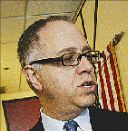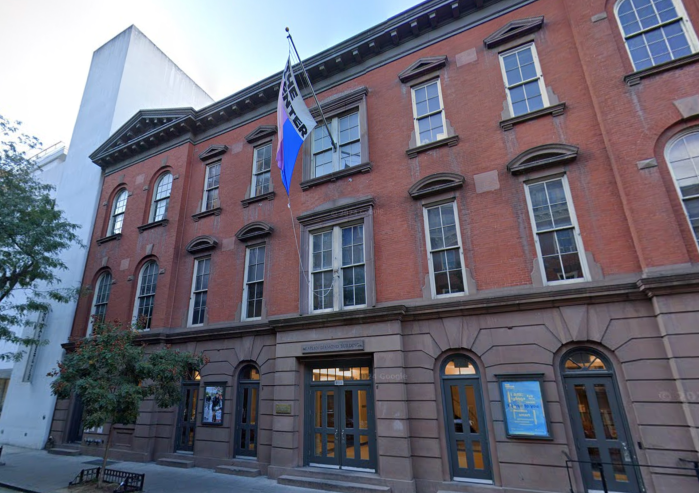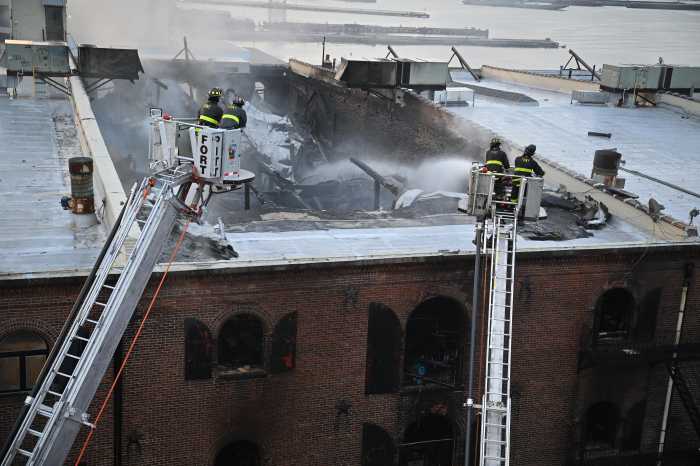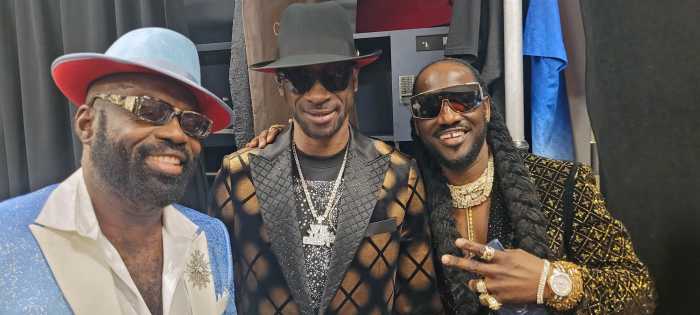Arthur Schwartz takes on Larry Moss for a downtown State Democratic Committee post
For the second time in four years, Larry Moss is facing competition for an office that he readily admits “often goes begging.”
Since 1990, Moss, a gay attorney who lives in NoHo, has represented Manhattan’s 66th Assembly District on the Democratic State Committee, a body made up of about 450 members charged with laying out policy positions for the party. For roughly half of that time, Moss chaired the Reform Caucus, which he said has been the chief engine behind proposed resolutions that end up winning approval. He currently serves as issues director for that caucus.
In next Tuesday’s Democratic Primary, Moss faces a challenge from Arthur Schwartz, a labor attorney who for many years served as the local Democratic district leader, another party post, one that affords close ties to grassroots political activists.
In discussing his challenge in a telephone interview this week, Schwartz focused largely on style.
“I don’t know if I disgagree with Larry Moss on the issues,” he said, even as he acknowledged that he supports Mark Green for attorney general and Moss backs Andrew Cuomo. “But on major issues I don’t know that there is disagreement.”
What he faulted Moss on was what he termed “a dilettantish approach.”
According to Schwartz, Moss is failing at the grassroots, not paying attention to the local Democratic clubs, and not reaching out to the community to rally support for the party’s positions and aims.
Schwartz contrasted his opponent’s work with his own, pointing to a go-getter style that he has demonstrated on the local community board, in efforts to save a local firehouse, to have a full hearing on a proposed solid waste transfer station, and in his professional capacity as attorney for the Transport Workers Union during its contentious transit strike last December.
Implicitly acknowledging that some of those achievements might suit him better for his old job as district leader, Schwartz also took aim at Moss’ policy work at the state level. Both men are ardent critics of the Bush policy in Iraq, but Schwartz said that Moss’ claims of successfully brokering an anti-war resolution at the state convention in May—getting the forces of Senator Hillary Rodham Clinton to agree not to block it in return for her challenger Jonathan Tasini not having his name put in nomination—did not advance the anti-war cause to the degree his opponent claims.
For his part, Moss pointed to the support he has from local elected officials and Democratic clubs to counter Schwartz’s argument that he’s lost touch with the community. The incumbent has been endorsed by City Council Speaker Christine Quinn, her colleague Rosie Mendez, State Senator Tom Duane, Assemblywoman Deborah Glick, and his fellow committeemember Rachel Lavine. He also has the support of the Gay and Lesbian Independent Democrats (GLID), the Village Independent Democrats (VID), the Downtown Independent Democrats (DID), and the Stonewall Democrats of New York City.
While Schwartz can claim the backing of the Village Reform Democrats and a relative newcomer, the Jim Owles Liberal Democratic Club, the defection of Quinn, Duane, VID, and GLID represents an erosion of support for Schwartz. The rupture in those former alliances were the key cause of Schwartz’s decision last year to relinquish the district leader job to Brad Hoylman, a former GLID president.
Meanwhile, Moss’ political standing has improved since his last challenge four years ago. At that time, Moss was opposed by attorney Larry Goldberg, who had the backing of former City Councilwoman Kathryn Freed. When Freed threatened to run herself in opposition to Lavine, Moss’ fellow committeemember and Glick both back-pedaled on their support for him. Still, Moss won the race.
In an interview on Saturday, the incumbent took particular exception to claims he said Schwartz made at several Democratic club presentations suggesting that Moss was not advancing his agenda on the State Committee, content to merely pass resolutions. The resolutions he has successfully steered through the Committee, Moss said, have become the implicit party platform—and represent goals he has worked hard to make a reality.
In addition to authoring the party’s two anti-war resolutions—the first passed during the fall of 2002, when President George W. Bush first sought congressional authority for his Iraq policy—Moss won statements of support for civil unions, and later marriage equality, and a call for a moratorium on use of the state’s death penalty. Moss explained that initially that last resolution had purely symbolic purpose, but when the Court of Appeals slapped a stay on implementation of the state’s death penalty statute, it became the rationale for the Democratic-controlled Assembly to simply not take up the issue of fixing the flaws in the Pataki administration’s law.
On marriage, Moss pointed to numerous steps he took to advance the spirit of the Committee resolution, including a widely-read 2004 op ed in the Daily News arguing that the gender-neutral language in the existing law already allowed for same-sex marriage and a plan to have an upstate city clerk who was gay issue marriage licenses to same-sex couples. That effort, was scotched when the marriage lawsuits were accepted for consideration by the state’s highest court.
One aspect of this race that both sides approach gingerly is that fact that the team that Moss stands with—Quinn, Mendez, Duane, Glick, and Lavine—are all lesbian or gay. Glick, who has a feud with Schwartz going back 10 years, suggested in an interview that Moss’ opponent, who is straight, may see a political opening in that fact.
“He is often trying to send a subtle message that there is a difference between the concerns of the community and those of the gay community,” she said.
“Hogwash,” Schwartz fired back. “” I will challenge anyone to find any way in which I tried to divide the community as a whole and the gay community. For many years I was the only straight elected official in the Village, and I had a great working relationship with everyone.”
Moss was unwilling to criticize Schwartz on the same basis that Glick raised. Noting that there are only six or seven openly gay members of the State Committee, he said, “I think it is fortunate to live in a district that can elect gay representatives and right now we are all working together as a team.. We are all now working to advance the equality agenda, particularly on marriage, at every level. It’s great that we have this team, and this is not the time to disrupt it.”
gaycitynews.com





























